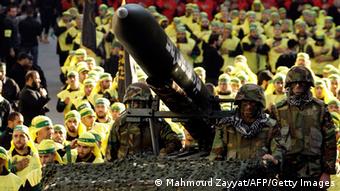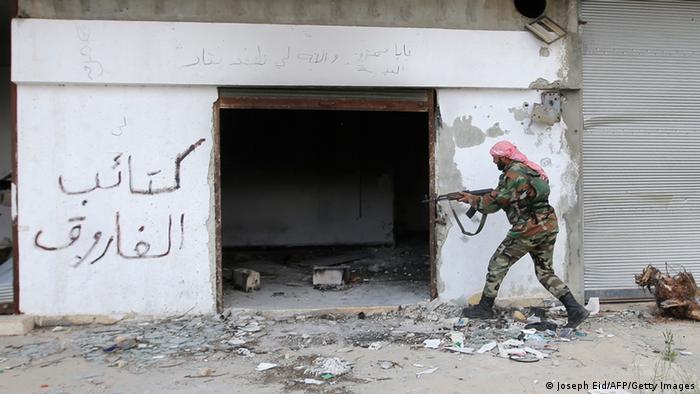The Shiite Hezbollah are fighting alongside regime troops in Syria. Much is at stake for the militant group: if Assad's regime falls, Hezbollah will be weakened in Lebanon.
The number of Hezbollah fighters killed in Syria is on the rise. According to Syrian human rights activists, the Lebanese group lost more than 100 fighters since getting involved in the Syrian civil war; Hezbollah has conceded 75 dead. The surge in the number of Hezbollah fatalities is mainly due to fighting alongside regime troops in the strategically important opposition stronghold of Qusayr near the Lebanese border.
Initially, the Shiite movement kept secret its support for Syrian President Bashar al-Assad. Meanwhile, killed Hezbollah militants are openly honored in public funeral services.
There are several explanations behind Hezbollah's support for the Syrian regime. For one, Hezbollah, Iran and Syria constitute a self-declared opposition front against Israel and the West, Rami Khouri of the American University Beirut says. "Should Syria and the Assad regime fall, that would be a harsh blow to Hezbollah and Iran," the political scientist told DW.
The Tehran-Damascus-Hezbollah axis wants to prevent other countries from rearranging the political map of the area, he says. Meanwhile Sunni Saudi Arabia and Qatar aim to limit the influence of Shiite Iran with a change in Syria's regime. Without Syria, the axis is missing its centerpiece, leaving the Lebanese Hezbollah and Iran largely isolated.
Assad's staunch ally
Secondly, Hezbollah backs Syria in order to strengthen its own power base in Lebanon, the Beirut analyst says: If the regime in Damascus falls, Hezbollah would be weakened in Lebanon, too. Hezbollah profits from the Syrian regime' political and logistic support: Damascus provides the group with intelligence information and transportation of equipment.
The Shiite movement's close ties to Iran would also be affected by the Syrian regime's downfall. In 1982, Tehran helped build up Hezbollah, and Iran still has significant influence on the group's political and military wing in Lebanon. Transporting Iranian weapons and fighters to Lebanon would be much more difficult without the direct route via Syria. Israel is the small state's only other neighboring country and UN peacekeeping forces have been patrolling off the Lebanese coast since 2006.
Hezbollah sends elite fighters
It is not clear how deeply Hezbollah has become involved in Syria. There might be several hundred or even several thousand fighters, Ely Karmon of the Institute for Counter-Terrorism in the Israeli city of Herzliya says. "These are elite troops that used to fight Israel in southern Lebanon," the political scientist says. If necessary, the group could even send its larger, though not as well-trained, militia, Karmon adds.
Hezbollah's backing of the Syrian regime underlines the complex religious and ethnic nature of Syria's civil war. The president and many of his supporters are Alawite, affiliated to Shiite Muslims. Apart from the Hezbollah Shiites and the Shiite Iranian revolutionary guards, they have no allies in the region. The Syrian rebels are largely backed by Sunni Muslims. According to Karmon, fighting at Qusayr is aimed at keeping open a fallback corridor to central Alawite areas on the Syrian coast, giving Hezbollah and Syria's Alawites a linked area under their control even if the insurgents should seize Damascus. "That is the reason for the fierce fighting in the area around Qusayr, with Shiite villages on both sides of the border," Karmon says.
Escalation in Lebanon
The combat operation has also exacerbated tensions in chronically unstable Lebanon. Hezbollah has been a significant power factor in the country for decades. The Sunni and parts of the Christian population are apprehensive about the militant organization, however. For days, the northern Lebanese port city of Tripoli has been rocked by bloody clashes between Sunni and Shiite residents, and between supporters and opponents of President Assad. "That makes the situation in the country even more tense, violent and unstable," Khouri says, adding it is difficult to say how it will develop.
The international community is increasingly concerned about the Shiite backing for Damascus, fearing the situation could spiral out of control. At a meeting this week in Amman the Friends of Syria group, which includes several Western and Arab states, demanded a withdrawal of all foreign militia from Syria, arguing their presence threatens regional stability. The EU is debating putting Hezbollah's armed wing on its list of terror organizations, which in turn would allow for more rigorous action against the organization. However Hezbollah leadership appears unfazed: additional fighters are now on their way to Syria, a spokesman in Beirut said. dw de


No comments:
Post a Comment